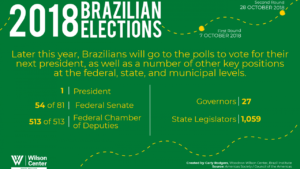
Wilson Center
Brazil’s digital environment is a fertile ground for innovative strategies to spread polarizing content with the intent of manipulating public debate, notes Caio C. V. Machado, a Brazilian lawyer and researcher at the Computational Propaganda Project at the Oxford Internet Institute.

Wilson Center
There are two factors that have made it difficult for Brazil to curb disinformation, Machado writes for the Council on Foreign Relations:
- First, Brazil’s net neutrality law doesn’t squarely ban the practice of zero-rating, where a telecom operator provides free and unlimited access to certain internet services. The economics of zero-rating incentivize Brazilians to stay within the walled gardens of the services they get for free. If someone skeptical of political content shared on WhatsApp wanted to verify its validity by searching the web, the web search would be counted towards the person’s mobile data cap—effectively forcing them to pay to fact check.
- Second, the country has been slow to implement its new personal data protection law. The law was passed earlier this year but the relevant regulatory mechanisms haven’t yet been implemented to ensure its full applicability. As a result, users have suffered as their personal information has been bought and sold to subject them to targeted advertisement, including receiving personal and profiled political messages via WhatsApp.







